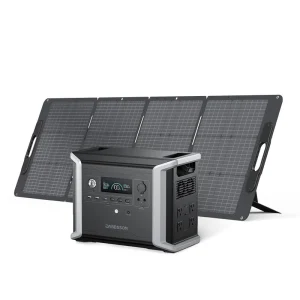There are many advantages to using a battery-powered generator that sets it apart from traditional gas models. One of the greatest benefits they hold is that they are environmentally friendly. Compared to gas generators which exude toxic CO2, battery-powered generators are emission-free and hence a top-pick for environmental buffs. A typical gas generator emits approximately 20 pounds of CO2 for every gallon of gasoline burned, and since a battery-powered generators releases none, air quality is improved and C02 emissions are decreased.
Operational efficiency: Battery-powered generators are also highly efficient running units. They are 85% energy efficient as approximately only 15% of the stored energy is lost when converted and in use. This high efficiency gives you the most power out of a single charge, making it an ideal option for long-term energy consumption. By contrast, gas-powered generators lose a greater percentage of their energy through heat loss which is why they are not nearly as efficient.
In addition, battery powered generator are also extremely portable and easy-to-use. Models are generally H35 to 45 x W17 to 55 x D18 to 25 inches for portables and 10-30 pounds for easy transport. Their portability makes them excellent for outdoor activities like camping or tailgating when you need a lightweight energy solution. Several models offer multiple types of charging ports: AC outlets, USB ports (which can now charge up to two or more devices), and even DC outputs (for powering essential items like light, your ice maker in the refrigerator,and router).
One of the other advantages with battery generators over a traditional style generator is in maintenance. For example, gas generators need to be maintained more often for things like oil changes and fuel systems while diesel does not. On the other hand, battery generators are easy to maintain: Just charge the battery and store it away in a cool, dry place. This low amount of maintenance means that it is also the cheapest in the long run other then removing your own body hair which tends to be a lot more painful, as well as time wasteful obviously.

Noise — They are quieter than gas generators, which usually produce 70–80 decibels of sound during operation — about the same as a vacuum cleaner. Battey-powered models are quieter: As quiet as 40 decibels—similar to a normal conversation. As a result, they are the best pick for using in residential areas and also while camping or when there is a power cut down inside your home without creating disturbance to others.
Battery-powered generators have another notable benefit, their longevity. Typically, the lifespan in most top models such as the Dabbsson DBS1000Pro Portable Power Station is 500 to 2,000 charge cycles based on usage and care. With moderate use, this can mean that your metal building will last you a decade to two decades, leaving them as a strong long-term purchase. Conventional gas generators, on the other hand, are designed for parts to be replaced more frequently and wear and tear on the engine means that it wears out sooner.
As energy expert Amory Lovins says, “Energy efficiency & storage are the only game in town that can backup #renewables wirk and will result in a sustainable future.” Examples of this innovation include battery powered generator, providing a cleaner, more efficient and sustainable solution to modern energy requirements.
To summarise, advantages of a battery powered generator are that they are emission free, have high efficiencies, require little maintenance and quiet operation with long lifetimes. Functionality of these advantages is making them perfect for all application sectors that includes camping, outdoor adventures, emergency backup power during hurricane outs etc and also paving the way for a green future.